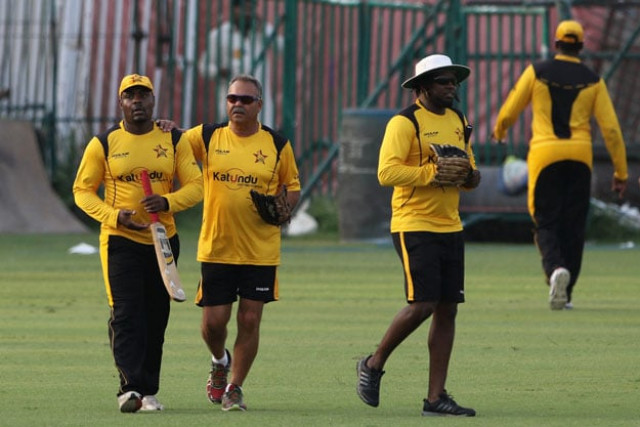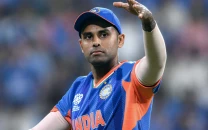Welcoming it back: Cricket’s departure and its return
A timeline of events that led to the suspension and then the impending revival of the sport in Pakistan

Zimbabwean team practicing at Qaddafi stadium in Lahore. PHOTO: MEHMOOD QURESHI/EXPRESS
The last multi-nation tournament to be held in Pakistan was the Asia Cup in 2008. Under the chairmanship of Nasim Ashraf, the Pakistan Cricket Board (PCB) succeeded in convincing major teams such as India and Sri Lanka — besides Bangladesh, Hong Kong and the UAE — to travel to the country as a largely successful tournament was staged in Lahore and Karachi despite the country plummeting into a deeply chaotic state of terror.
The last international team to tour Pakistan was Sri Lanka who infamously left the tour after being targeted by terrorists during the second and final Test of their 2009 tour.
From there on, it has been a series of ups and downs but a long hard road has finally ended in success.
February 2009 — Losing the Champions Trophy hosting rights
While the common perception remains that the March 2009 strike on the Sri Lanka team bus brought international cricket to a grinding halt, the PCB was in fact struggling to invite foreign teams consistently as back as the noughties — Australia’s last tour to Pakistan was in 1998 while the West Indies’ only visit came in 2006.
Due to the reluctance of leading cricketing nations to tour Pakistan, the ICC postponed the Champions Trophy in 2008 — set to take place in Pakistan — before eventually rescheduling the tournament and choosing South Africa as the alternate hosts in September 2009. The decision was announced on February 1 but did not go down too well with Pakistan. Former captain Ramiz Raja at the time stated, “I think Pakistan has done enough to tell the world that cricket is not targeted in the country.” His words though were to lamentably come back to haunt him in a month’s time.
March 2009 — Sri Lankan team attack
Like the Karachi Test — where Younus Khan racked up 313 — the batsman-friendly wicket in Lahore had provided another run glut during the first two days.
But the players didn’t even make it to the ground on day three as, merely minutes away from the stadium’s entrance, gunmen opened fire at the Sri Lankan team bus. Several were killed and many others injured but other than batsman Thilan Samaraweera, none of the players were seriously hurt in the ambush.
April 2009 — Losing the 2011 World Cup hosting rights
“It is a regrettable decision [but] our number one priority is to create certainty and deliver a safe, secure and successful event,” the then ICC president David Morgan announced in a statement; stripping the hosting rights from Pakistan— who were supposed to be one of the co-hosts of the 2011 World Cup. The tournament was eventually hosted by India, Sri Lanka and Bangladesh with Pakistan’s group games instead hosted in Colombo and Pallekele.
The then PCB chairman Ijaz Butt once again cut a helpless figure when asked to explain the ICC decision. “It’s a disappointing decision but it can’t be helped. Nobody wants to play in Pakistan following the attacks in Lahore,” said Butt.
October 2012 and April 2013 — Bangladesh snub tours
After Butt ‘served out’ his tenure, his replacement Zaka Ashraf tried to rebuild the bridges and approached Bangladesh for a short tour in October 2012. After a series of negotiations with the Bangladesh Cricket Board (BCB) officials, Ashraf made a claim that a tour will take place in December 2012.
But then Bangladesh backed out. After another series of meetings and the visit of a high-level delegation led by board president Mustafa Kamal, a new date — April 2013 — was announced for a two-match tour (one ODI and one T20).
But again, just days before the tour a petition, questioning the security and safety of the team in Pakistan, moved in the Dhaka High Court disengaged the two boards and Bangladesh backed out of its commitment once more, much to the dismay of the PCB since the Pakistan board had withdrawn their right of nominating the ICC Vice-President in favour of the BCB candidate.
December 2014 — Kenya tour to Lahore
After Zaka Ashraf was sent packing following a series of court battles with Najam Sethi, the reins of the PCB were eventually handed to seasoned diplomat Shaharyar Khan last August.
In December last year, Kenya became the second ICC associate team after Afghanistan to tour Pakistan since the Sri Lanka attack.
The series included five unofficial ODI games against the Pakistan A side. Like the tour of Zimbabwe, all games were scheduled at the Gaddafi Stadium and attracted decent crowds to the venue despite stringent security measures.
The incident-free series was to prove a major step in ensuring the Zimbabwe tour; conversely though, the barbaric tragedy in Peshawar— the terror attack at the Army Public School — coincided with one of the ODIs and dampened the spirits of players on both sides.
May 2015 — Zimbabwe confirm Pakistan tour after security team’s visit
After lengthy deliberations on the sidelines of April’s ICC Executive Board meeting in Dubai, Zimbabwe Cricket (ZC) officials confirmed that they were deliberating upon the possibility of touring Pakistan.
The prospects of the series were further strengthened when the PCB agreed to cover all expenses of the tour besides financing the dailies and the allowances of the touring squad.
Last week was then shrouded in uncertainty as ZC conveyed to the international media that they were pulling out of the tour in the aftermath of a bus attack in Karachi, only to change their stance within minutes as PCB’s think-tank made desperate efforts to salvage the tour.
There was success at long last for the cricket board as a squad of 28 players and officials arrived in the wee hours of May 19 to trigger a rousing welcome both at the airport and the team hotel.
The Zimbabweans are currently enjoying Lahore’s hospitality and all efforts are being made to make the tourists feel at home as millions of cricket fans, both in and outside Pakistan, eagerly await the unfolding of the action in the first T20 at Gaddafi this Friday.

Other events worth a mention
• ICC Chief Executive Dave Richardson visited Karachi to witness the Quaid-e-Azam Trophy final played under lights with a pink ball in January 2011. Richardson ruled out the chances of international cricket in Pakistan at the time, reaffirming that the reason for his visit was solely to gauge the impact of the pink ball.
• Australia’s Dav Whatmore coached Pakistan for two years from 2012 to 2014 and frequently visited and stayed in Lahore and other parts of the country during his assignment, his team also included foreign trainers and fielding coaches.
• Currently Pakistan’s team management includes foreign coaches and trainers such as Grant Flower, Grand Luden and Brad Robinson.
• Three prominent former cricket stars — Jonty Rhodes, Herschelle Gibbs (South Africa) and Damien Martyn (Australia) — stayed in Islamabad during the recent World Cup. The trio were engaged by a local sports channel as TV experts.
Published in The Express Tribune, May 21st, 2015.
Like Sports on Facebook, follow @ETribuneSports on Twitter to stay informed and join in the conversation.



















COMMENTS
Comments are moderated and generally will be posted if they are on-topic and not abusive.
For more information, please see our Comments FAQ